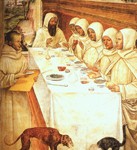 We talk a lot about being “community” and we use the term a great deal in general terms; the parish community, the city as a community, the monastic community. But do we think any further on what it actually means?
We talk a lot about being “community” and we use the term a great deal in general terms; the parish community, the city as a community, the monastic community. But do we think any further on what it actually means?
Michael Casey, OSCO, talks a great deal about the subject in his book Strangers to the City. In it he writes:
“Living in community involves my recognizing that I am not alone in the house. I do not have unrestricted access to community resources. These are to be shared by all. I alone do not have the right to decide future directions; each accredited member will have something to contribute to the common vision. If something is to be done, all are to be consulted, and sometimes the solution adopted will go against my preferences. I need to have an entrenched belief in the probable integrity of options taken as a result of the common decision-taking and leave the outcome to Providence” (pp. 116-117).
Now, reread the statement slowly and think how this might apply within the home. Societal trends show that what Casey writes is so different from what we actually experience. If the surveys are correct, in many families the children run the household while the parents are complacent, basically giving large portions of income so the children are not “deprived” based on the society they live in. And the children expect it. Then there are other families where parents spend inordinate amounts of money on themselves with little or no regard for the children. We cannot do anything directly for many of these families, we can only openly examine how we care for our own and support the programs and agencies dealing with these issues with our own time and money.
While we are entitled to a share in the communities’ resources “each accredited member will have something to contribute to the common vision” or purpose. Does your family have a common purpose? Does it even discuss a common purpose? Probably not because we have become a population obsessed with “me” and not “us.” But St. Benedict calls us to community, not self.
But you say this is the ideal, not something that will really work in the world today? Really? Then what of the Oblate’s Oblation to live the Rule in their daily life? Does not Benedict specifically say “As often as anything important is to be done in the monastery, the abbot shall call the whole community together and himself explain what the business is …” (RB 3:1) For the Oblate the monastery is not just Belmont Abbey but also their own family home, the “domestic Church.” The parents are the “abbot” of the family or maybe the more appropriate term “abba” or “amma.” The parents are the spiritual guides for the children but parents must also set the example by living what they say.
“But they are just children. What do they know? They have neither the age nor wisdom to help make decisions.” Not when it comes to the “community.” St. Benedict is very clear that even the youngest should have a voice since “… the Lord often reveals what is better to the younger.” (RB 3:3) As the Abbot must do in the monastery, so the “seniors” or parents must do in the family, we must be constantly watchful for how the Lord will reveal his wishes in a situation. And if we are devoted in prayer and patient Our Lord will make himself known, and often from the children.
But this does not mean the children are running the show, the decision is always the “abba’s” (RB: 3:5) And the members of the community are not “…to contend with his abbot defiantly, or outside the monastery”(RB 3:9) Nor is anyone to “…follow their own heart’s desire…” (RB 8). Simply put the needs of all must be considered within the family avoiding “… all favoritism”(RB 2:16). Children must understand this, but so should the parents for “… all are to follow the teaching of the rule, and no one shall rashly deviate from it.”
So think about how you apply the Rule in your own daily life. Is it something that is private or does it apply more broadly. Perhaps this example may have you take a second look at the wisdom of St. Benedict. The Rule has broader implications to us and the “monastery” we live in.
